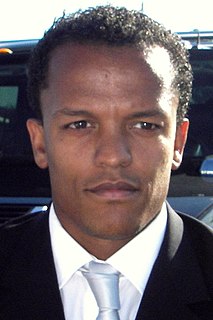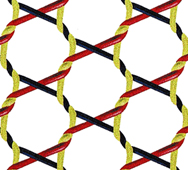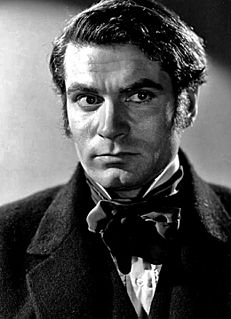William Earnshaw may refer to:
- William Earnshaw (politician), New Zealand member of parliament
- William Earnshaw (minister), American minister
- William C. Earnshaw, professor of chromosome dynamics
William Earnshaw may refer to:
Silicon is a chemical element with the symbol Si and atomic number 14. It is a hard, brittle crystalline solid with a blue-grey metallic lustre, and is a tetravalent metalloid and semiconductor. It is a member of group 14 in the periodic table: carbon is above it; and germanium, tin, lead, and flerovium are below it. It is relatively unreactive. Because of its high chemical affinity for oxygen, it was not until 1823 that Jöns Jakob Berzelius was first able to prepare it and characterize it in pure form. Its oxides form a family of anions known as silicates. Its melting and boiling points of 1414 °C and 3265 °C, respectively, are the second highest among all the metalloids and nonmetals, being surpassed only by boron. Silicon is the eighth most common element in the universe by mass, but very rarely occurs as the pure element in the Earth's crust. It is most widely distributed in space in cosmic dusts, planetoids, and planets as various forms of silicon dioxide (silica) or silicates. More than 90% of the Earth's crust is composed of silicate minerals, making silicon the second most abundant element in the Earth's crust, after oxygen. Silicon is a natural element, and when not previously present has a residence time of about 400 years in the world's oceans.

Wuthering Heights is an 1847 novel by Emily Brontë, initially published under the pseudonym Ellis Bell. It concerns two families of the landed gentry living on the West Yorkshire moors, the Earnshaws and the Lintons, and their turbulent relationships with Earnshaw's adopted son, Heathcliff. The novel was influenced by Romanticism and Gothic fiction.

The London and North Eastern Railway (LNER) was the second largest of the "Big Four" railway companies created by the Railways Act 1921 in Britain. It operated from 1 January 1923 until nationalisation on 1 January 1948. At that time, it was divided into the new British Railways' Eastern Region, North Eastern Region, and partially the Scottish Region.
Thomas or Tom Bradley may refer to:

Robert Earnshaw is a Welsh former international footballer who played as a forward. He is the only player to have scored a hat-trick in the Premier League, all three divisions of the English Football League, the League Cup, the FA Cup, and for his country in an international match.

Wuthering Heights is a 1939 American romantic period drama film directed by William Wyler, produced by Samuel Goldwyn, starring Laurence Olivier and Merle Oberon as the romantic leads. It is based on the 1847 novel Wuthering Heights by Emily Brontë. The film depicts only 16 of the novel's 34 chapters, eliminating the second generation of characters. The novel was adapted for the screen by Charles MacArthur, Ben Hecht, and John Huston.

Bobbinet tulle or genuine tulle is a specific type of tulle which has been made in the United Kingdom since the invention of the bobbinet machine. John Heathcoat coined the term "bobbin net", or bobbinet as it is spelled today, to distinguish this machine-made tulle from the handmade "pillow lace", produced using a lace pillow to create bobbin lace. Machines based on his original designs are still in operation today producing fabrics in Perry Street, Chard, Somerset, UK.
Adrian John Earnshaw MHK is a Manx politician, who was the Minister of Home Affairs in the Isle of Man Government and a Member of the House of Keys for Onchan.

Heathcliff is a fictional character in Emily Brontë's 1847 novel Wuthering Heights. Owing to the novel's enduring fame and popularity, he is often regarded as an archetype of the tortured antihero whose all-consuming rage, jealousy and anger destroy both him and those around him; in short, the Byronic Hero.

Wuthering Heights is a 1970 film directed by Robert Fuest and starring Anna Calder-Marshall and Timothy Dalton. It is based on the classic 1847 Emily Brontë novel of the same name. Like the 1939 version, it depicts only the first sixteen chapters concluding with Catherine Earnshaw Linton's death and omits the trials of her daughter, Hindley's son, and Heathcliff's son.

William Earnshaw was a New Zealand Member of Parliament for two Dunedin electorates representing the Liberal Party. He later served on the Legislative Council. He was one of the first labour representatives in Parliament.
Peninsula was an Otago electorate in the New Zealand Parliament from 1881 to 1893, based on the Otago Peninsula.
Earnshaw may refer to:

William Earnshaw, D.D. was an American minister who served in the Union Army as a chaplain and as the 8th Commander-in-Chief of the Grand Army of the Republic, 1879-1880.

Lace machines took over the commercial manufacture of lace during the nineteenth century.
The Canadian Screen Award Award for Best Direction in a Children's or Youth Program or Series is a Canadian Screen Award that honours direction in English language children's television produced in Canada.
William Charles Earnshaw is Professor of Chromosome Dynamics at the University of Edinburgh where he has been a Wellcome Trust Principal Research Fellow since 1996.
The New Year Honours 1897 were appointments by Queen Victoria to various orders and honours to reward and highlight good works by members of the British Empire. They were published on 1 January 1897.
The Pusher machine was a lace making machine, based on the bobbinet, that was invented in 1812 Samuel Clark and James Mart.
Love and a Bottle is a 1698 comedy play by the Irish writer George Farquhar. Written shortly after Farquhar, an Irish Protestant originally from Derry, moved to London its central character is an Irishman Roebuck who has fled from Ireland after getting a woman pregnant. Resisting his father's demand that he marry the woman, he is followed to the English capital by the recent mother of his son.